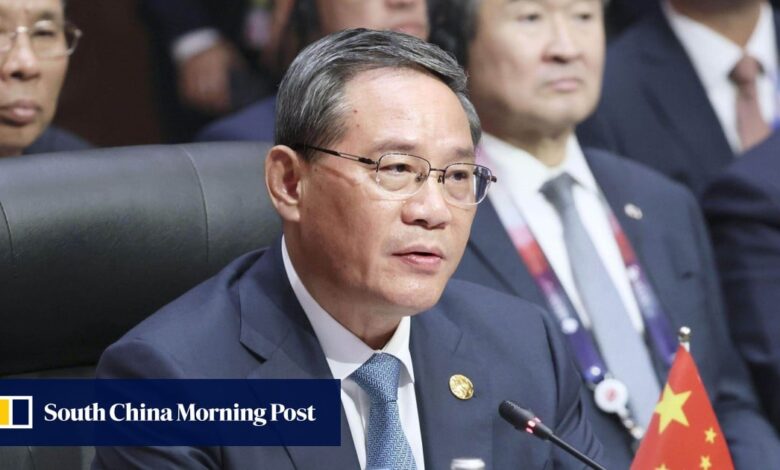China wants to ‘work with Japan to relive spirit’ of 1978 peace and friendship treaty

No official celebratory events for the 45th anniversary were held in August, due to rising tensions over the imminent release of waste water from Japan’s tsunami-stricken Fukushima nuclear plant.
The fallout saw Li and Kishida trade barbs when they met in Jakarta on September 6 at the Asean Plus Three summit, involving the 10 Association of Southeast Asian Nations, plus China, Japan and South Korea.
In his message to Kishida on Monday, marking 45 years since the peace treaty took effect, Li said China was willing to work with Japan to relive the spirit of the treaty, stay the course in steering bilateral relations, and build a relationship that “meets the requirements of the new era”, according to a Chinese foreign ministry readout.
Hailing the “strategic foresight” of concluding such a treaty back then, Li said it had established a “general direction of peaceful coexistence and long-lasting friendship between two neighbours and the emphasis on opposing hegemony, which has become an important milestone in the development of bilateral relations”.
The Chinese readout quoted Kishida as emphasising the significance of ensuring “constructive and stable” bilateral relations, taking into account the responsibilities both countries bear for peace and prosperity in the region and the world, along with the potential of collaboration in various fields.
The bilateral accord stipulates that the two countries “shall in their mutual relations settle all disputes by peaceful means and shall refrain from the use or threat of force” and that “neither of them should seek hegemony”, and shall oppose efforts by any other countries to establish such hegemony.
Such core principles marked in the treaty are still the guidelines to be abided by when handling China-Japan relations, and they also have practical guiding significance for solving the risks and challenges that the world faces nowadays, foreign ministry spokeswoman Mao Ning said at a regular press conference on Monday.
“Sino-Japan relations are at a critical stage of improvement and growth, while at the same time facing many risks and challenges,” Mao said, adding that the two sides should take the anniversary as an opportunity to “deepen mutually beneficial cooperation and properly manage conflicts and differences”.
In addition to legacy issues like territorial disputes and wartime history, bilateral ties have been rocky in recent years over Tokyo raising concerns about Beijing’s growing military might and security in the Taiwan Strait, and US efforts to keep Beijing in check in partnership with Asian allies, including Japan.
The backlash stemming from the Fukushima waste water release is the latest on the list.
There are hopes that Li and Kishida might hold talks on the sidelines when a trilateral summit with South Korea is revived later this year.
China and South Korea should ‘meet each other halfway’: Xi Jinping
China and South Korea should ‘meet each other halfway’: Xi Jinping
South Korea has proposed a three-way foreign ministerial gathering late next month to lay the groundwork for the leaders’ summit. The final arrangements will be made after taking into consideration China’s response and the latest international situation, Kyodo reported last week, citing diplomatic sources.
The trilateral leaders’ summit, launched in 2008, has not been held since 2019 amid the coronavirus pandemic and both neighbours’ strained ties with China.





